South Carolina Democratic primary: Are black voters losing faith in Joe Biden?
- Published
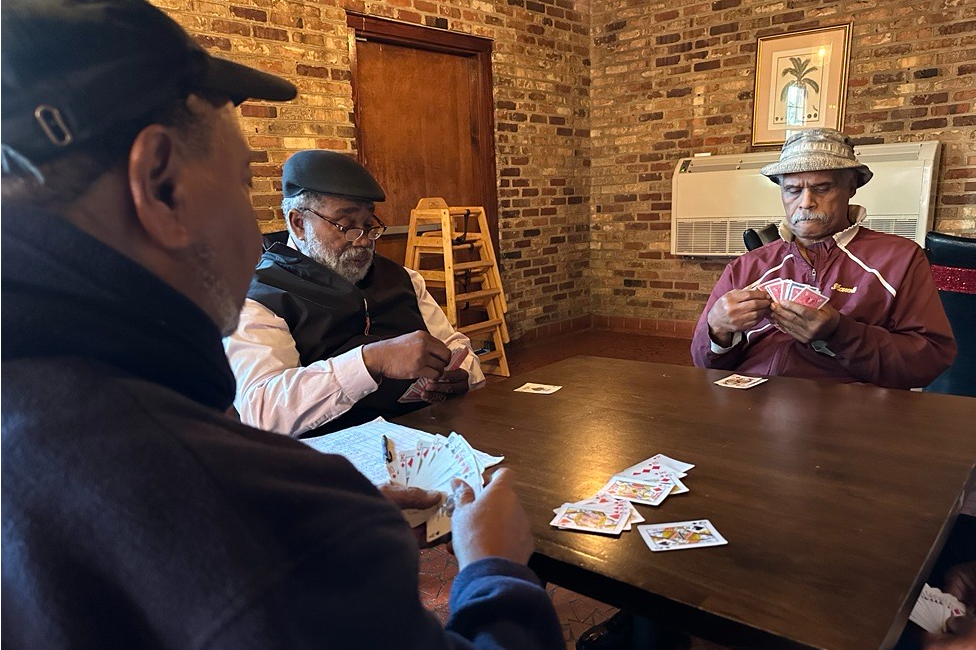
Tyrone Dash, pictured left, plays cards with long-time friends in Orangeburg County
Black voters were a key part of the coalition that helped Joe Biden win the White House, and he will need their overwhelming support to do it again. In South Carolina, however, many are frustrated with the president - and some are backing Donald Trump.
A 40-minute drive from the sparkle and polish of Columbia, South Carolina, is the town of Winnsboro, which lacks both.
It's a place Nocola Hemphill calls home - a home which, as she describes it, sounds like it's a world away from the state capital. Empty streets, abandoned businesses and vacant homes. Joblessness. Hopelessness.
It's been that way for years, she says. "There's no one reaching down here to lift anyone up. You have to wonder, does anyone really care?"
The 47-year-old is the CEO of the US Black Women's Chamber of Commerce, an organisation supporting small business development for black women across the country, an effort she says hasn't been noticeably aided by the Biden administration.
"I voted for Joe Biden in 2020, but I'm still waiting," Hemphill says. "I'm still waiting on tangible change for my vote - for my people."
Just a few days before the Democratic primary election in her state - the first contest in the process to formally pick the party's presidential candidate - she wasn't sure if he still had her vote.
And she's not alone.
A recent New York Times and Sienna College poll found that in six key swing states 71% of black voters would back Mr Biden in 2024, a steep drop from the 92% nationally that helped him win the White House at the last election. Other surveys suggest black voters are warming to Donald Trump, the current Republican frontrunner and President Biden's likely November opponent.
These are votes the president cannot afford to lose.
His 2020 win over Mr Trump was in part driven by black voters. They helped him win in critical swing states, including Georgia, where a historic black voter turnout made Mr Biden the first Democratic presidential nominee to carry the state since 1992.
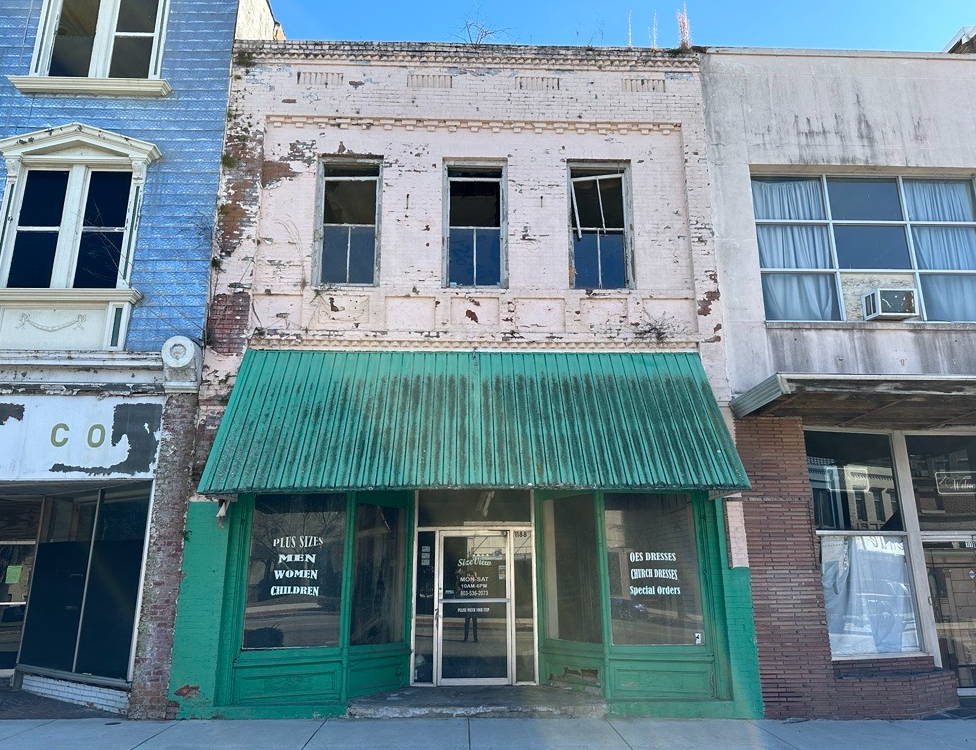
Neglected businesses line the street of Orangeburg's downtown historic district.
Todd Shaw, a University of South Carolina political science professor, told the BBC that if Mr Biden fails to get a strong showing from black voters from the state in Saturday's primary, it could spell trouble for his campaign for re-election."Black voters in South Carolina mirror trends among black voters nationally. So, what happens here could be an indicator of what's to come."
President Biden pushed hard to change his party's rules so that South Carolina is the first state to vote in the nomination process. A Biden campaign adviser told the BBC the move was intended "to make sure the process reflected the diversity of our party".
Over a quarter of South Carolina's population is black. And it was South Carolina's black voters who saved Biden's lacklustre bid for the Democratic nomination in 2020 by handing him his first win.
"You're the reason I'm president," Mr Biden told a mostly black crowd in the state one evening in January. "You're the reason Donald Trump is a loser, and you're the reason we're gonna win and beat him again."
It was one of several stops Mr Biden and his supporters have made in South Carolina this year, smiling for cameras at historically black colleges, shaking hands at barbershops, all the while, reminding voters of the "record achievements" his administration has made in their communities.
The BBC spoke to lots of voters in the state who do support the president - and he's expected to win the primary comfortably.

More on the US election

For many South Carolina black voters, however, the president's words feel disconnected from their realities.
Kenard Holmes, a junior at South Carolina State University (SCSU), told the BBC he was not excited by Mr Biden's campaign. "I know I'm going to vote. I'm just not sure who I'm voting for."
The 20-year-old remains unconvinced of the historic investments the White House says it has made into black colleges like his.
In the university building where Holmes meets weekly with his gospel choir, he says conditions are "embarrassing". "If it's cold outside, it's cold in there. If it's hot outside, it's hot in there," Holmes says. "It's been like that for years."
Data shows that other black voters in South Carolina have similar reasons to be disenchanted.
In 2022, eight of the state's top 10 counties with the highest poverty rates were majority black - averaging over 27%. And in more bustling areas like Charleston, US census data shows poverty rates were nearly twice as high in one of the city's majority-black neighbourhoods compared to its majority-white county.
Although the state is run by Republicans, there is a sense the president could have done more.
Matthew Guah, the dean of SCSU's business school, agrees that although money has been invested into black communities, it hasn't been substantive enough to move the needle.
"Record investment just means more than before. Record investment doesn't mean they got everything they need," he says.
Ronnie Bennett, co-owner of the Broughton Street Cafe in Orangeburg County, told the BBC: "If Biden has put money into black communities, I don't see it."
Ms Bennett plans to vote for Joe Biden again but mostly out of obligation, feeling Democrats offer her the most hope. "Our ancestors fought for the right to vote, so we exercise that right whether we like who's running or not," she says.
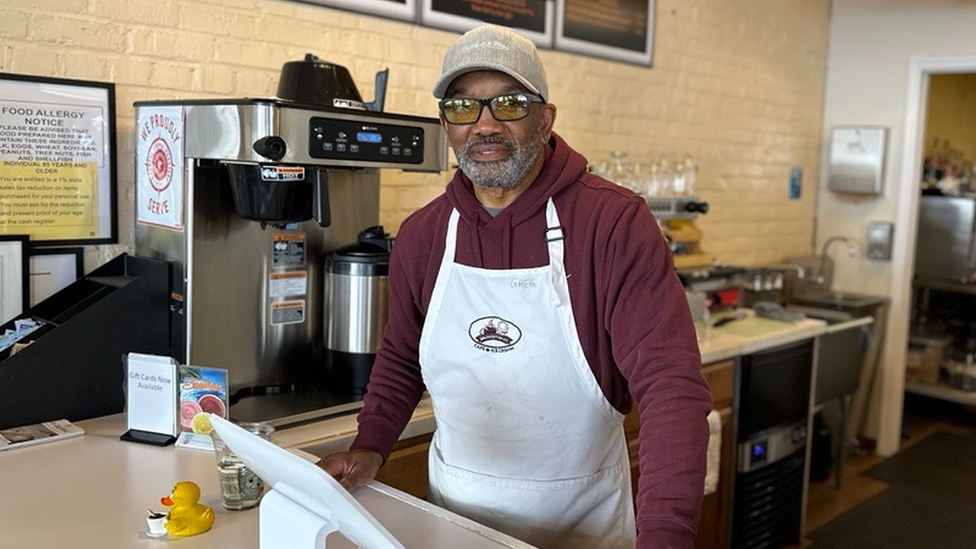
Greg Bennett runs the cafe with his wife Ronnie
Her shop is located in Orangeburg's downtown historic district, less than a mile away from SCSU. Deserted sidewalks, boarded windows and crumbling buildings hug the downtown streets, save for a scant number of new businesses like Bennett's.
The cafe's freshly painted exterior and colourful wood-warmed interior injected vibrancy into the neighbourhood when it opened in 2022, but little has come after, Bennett says.
Others are eager to support Mr Biden, alarmed by the possibility of Donald Trump returning to the White House.
Cecil Williams is the owner of the South Carolina Civil Rights Museum, where relics from one of the darkest chapters in American history are showcased.
Inside, an original copy of The Clansman - the early 20th Century novel glamourising the Ku Klux Klan - sits just feet away from emptied shotgun shells used by police to kill unarmed black student protestors on SCSU's campus.
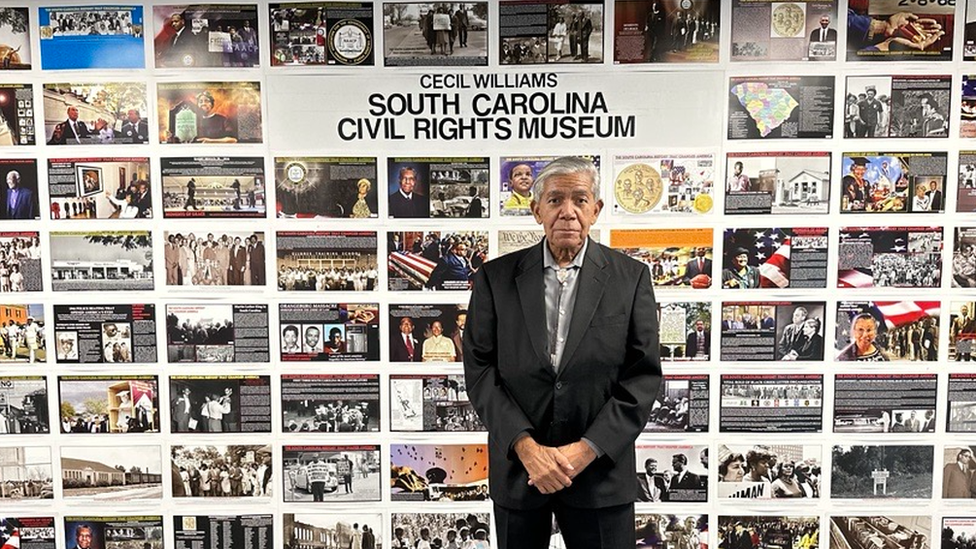
Cecil Williams is the founder of the South Carolina Civil Rights Museum - he also took many of the photos
The museum's artefacts are relics of a racist past that Williams fears Donald Trump is rekindling. The former president has faced accusations of racism - which he denies - including for pushing the false claim that Barack Obama was not born in America and for telling four minority congresswoman to "go back" to where they came from.
"We need someone like Joe Biden in the White House now more than ever. Just look at the alternative," Williams says.
"If we stay home, we lose this election. We can't let that happen."
But as Mr Trump seeks the presidency for a third time, he'll be looking to take advantage of Democrats' shrinking stronghold on black voters.
"That's just an opportunity that we would be remiss if we didn't exploit," a senior adviser to the Trump campaign said, according to the Associated Press.
In addition to multiple celebrity endorsements from rappers like Lil Wayne and Kodak Black, Mr Trump has increasingly positioned himself on camera with his now-defeated opponent, Tim Scott.
Mr Scott, South Carolina's first black US senator, has been widely discussed as a possible vice-presidential pick for Mr Trump.
It's an idea Mr Scott seems to be courting. "I just love you", he told the former president from the stage after Mr Trump's latest victory in the Republican race.
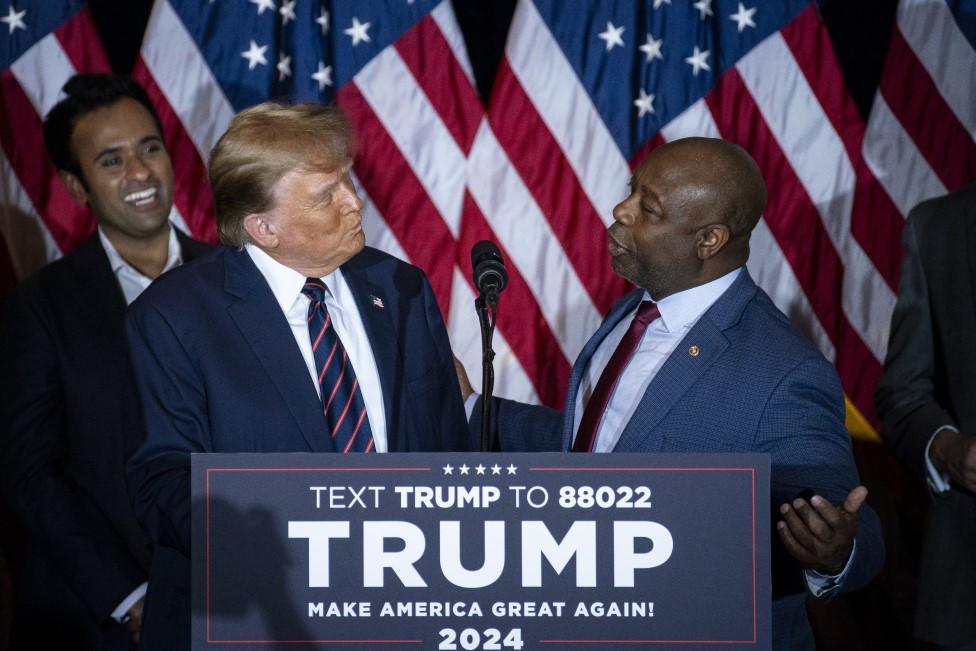
In Winnsboro, where the population barely nudges above 3,000, and the fried chicken gets served at the gas station, voter frustration is not hard to find.
There's a barbershop on the town's main street, one of few businesses not permanently closed.
Clarence Pauling, the shop's owner, has a quick response for anyone who asks him what he thinks of President Biden: "I'll never vote for Biden again."
The proposition itself sparks a stir in the small black-owned business.
"Yes Lord!" one man shouted, listening in while getting his hair cut. "Giving all that money to Ukraine. You got people right here that need it. We got homeless people sleeping at the bus stop."
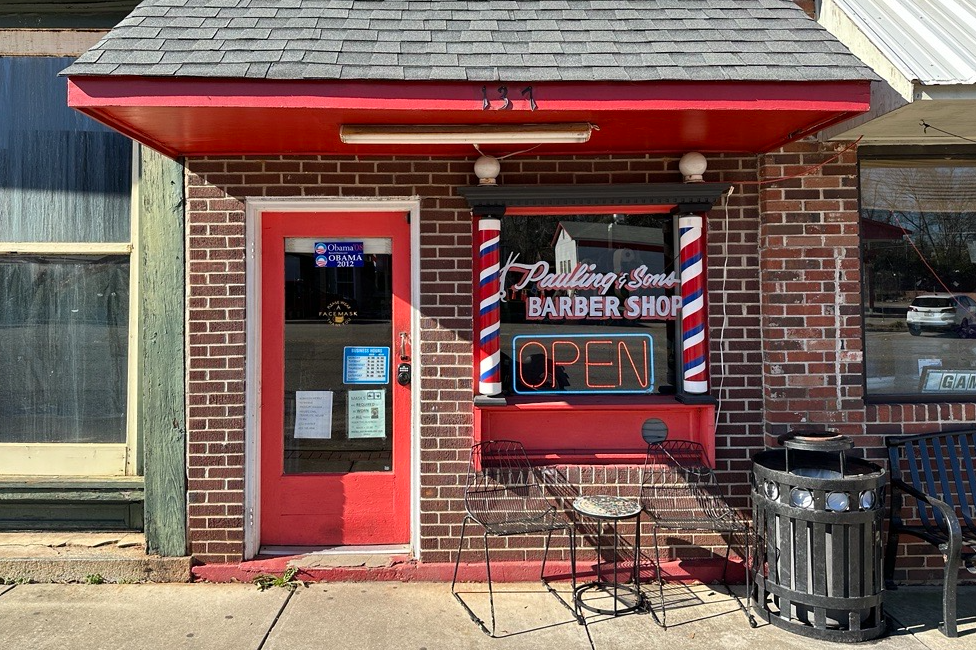
Pauling & Sons barber shop is a family-owned business that's been in Winnsboro for over 60 years
Mr Pauling, 49, historically has been a staunch Democratic supporter and says he even used his barbershop to register voters to support Barack Obama during the 2008 and 2012 elections.
But not this year.
He's strongly considering voting for Donald Trump, a desired change of pace from Mr Biden who he says "talks a good game, but doesn't deliver".
Others in the barbershop agree and express frustration with the cost of gas and groceries.
"Trump tells the truth," says Pauling, laughing as he recalled when Mr Trump frankly told Hillary Clinton that he uses the "rigged system" to his advantage.
"I can dig that. I'm tired of everybody trying to be politically correct," he said. "Tell it like it is."